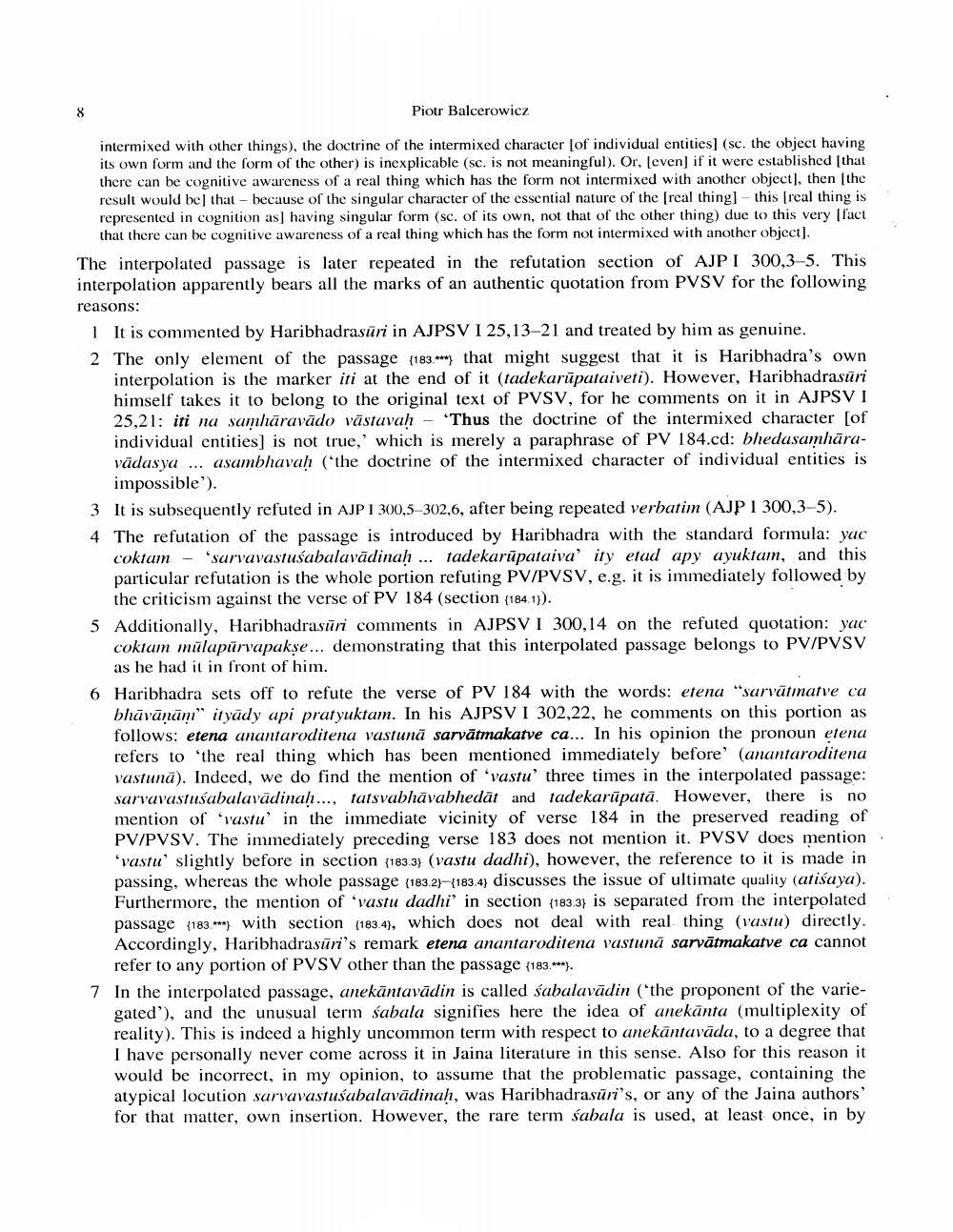Book Title: Dharmakirtis Criticism Of Jaina Doctrine Of Multiplexity Of Reality Anekantavada Author(s): Piotr Balcerowicz Publisher: Piotr Balcerowicz View full book textPage 8
________________ Piotr Balcerowicz intermixed with other things), the doctrine of the intermixed character (of individual entities] (sc. the object having its own form and the form of the other) is inexplicable (sc. is not meaningful). Or, leven if it were established [that there can be cognitive awareness of a real thing which has the form not intermixed with another object), then the result would be that because of the singular character of the essential nature of the (real thing! - this real thing is represented in cognition as having singular form (sc. of its own, not that of the other thing) due to this very fact that there can be cognitive awareness of a real thing which has the form not intermixed with another object) The interpolated passage is later repeated in the refutation section of AJPI 300,3-5. This interpolation apparently bears all the marks of an authentic quotation from PVSV for the following reasons: | It is commented by Haribhadrasuri in AJPSV I 25,13-21 and treated by him as genuine. 2 The only element of the passage (183.-; that might suggest that it is Haribhadra's own interpolation is the marker iti at the end of it (tadekarūpataiveti). However, Haribhadrasuri himself takes it to belong to the original text of PVSV, for he comments on it in AJPSVI 25,21: iti na samhäravādo västavah - "Thus the doctrine of the intermixed character [of individual entities] is not true,' which is merely a paraphrase of PV 184.cd: bhedasamhāravādasya ... asambhavah ("the doctrine of the intermixed character of individual entities is impossible'). 3 It is subsequently refuted in AJP I 300,5-302,6, after being repeated verbatim (AJP 1 300,3-5). 4 The refutation of the passage is introduced by Haribhadra with the standard formula: yac coktam - 'survavastusabalavādinah ... tadekarūpataiva' ity etad apy ayuktam, and this particular refutation is the whole portion refuting PV/PVSV, e.g. it is immediately followed by the criticism against the verse of PV 184 (section (184.1)). 5 Additionally, Haribhadrasūri comments in AJPSVI 300,14 on the refuted quotation: yac coktam mülapürvapakşe... demonstrating that this interpolated passage belongs to PV/PVSV as he had it in front of him. 6 Haribhadra sets off to refute the verse of PV 184 with the words: etena "survātmatve ca bhāvānām" ilyády api pratyuktam. In his AJPSV I 302.22, he comments on this portion as follows: etena anantaroditena vastunā sarvātmakatve ca... In his opinion the pronoun etena refers to the real thing which has been mentioned immediately before' (anantaroditena vastunā). Indeed, we do find the mention of 'vastu' three times in the interpolated passage: sarvavastusabalavādinah..., tatsvabhāvabhedāt and tadekarūpatā. However, there is no mention of vastu' in the immediate vicinity of verse 184 in the preserved reading of PV/PVSV. The immediately preceding verse 183 does not mention it. PVSV does mention 'vastu' slightly before in section (183.3) (vastu dadhi), however, the reference to it is made in passing, whereas the whole passage (183.2)-(183.4; discusses the issue of ultimate quality (atisaya). Furthermore, the mention of 'vastu dadhi' in section (183.3} is separated from the interpolated passage (183 ***) with section (183.4), which does not deal with real thing (vastu) directly. Accordingly, Haribhadrasūri's remark etena anantaroditena vastunä sarvātmakatve ca cannot refer to any portion of PVSV other than the passage (183.**). 7 In the interpolated passage, anekāntavādin is called sabalavādin ('the proponent of the varie gated'), and the unusual term sabala signifies here the idea of anekānta (multiplexity of reality). This is indeed a highly uncommon term with respect to anekantavāda, to a degree that I have personally never come across it in Jaina literature in this sense. Also for this reason it would be incorrect, in my opinion, to assume that the problematic passage, containing the atypical locution sarvavastusabalavādinah, was Haribhadrasūri's, or any of the Jaina authors' for that matter, own insertion. However, the rare term śabala is used, at least once, in byPage Navigation
1 ... 6 7 8 9 10 11 12 13 14 15 16 17 18 19 20 21 22 23 24 25 26 27 28 29 30
